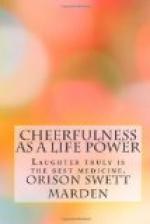“‘Come on, Jim. I know where there’s lots of nuggets.’
“An’ what do you s’pose, now? That boy had a kind of a game that that there field was what he called a plasser mining field; and he got me into it, and I could ‘a’ sworn I was in Californy all day,—I had such a good time.
“‘Only,’ says Henry, after we’d got through the day’s work, ’the way you get rich with these nuggets is to get rid of ’em, instead of to get ‘em.’
“That somehow didn’t strike my fancy, but we’d had play instead of work, anyway, an’ a great lot of stones had been rooted out of that field.
“An’, as I said before, I can’t give ye any dictionary definition of optimism; but if your Uncle Henry wa’n’t an optimist, I don’t know what one is.”
At life’s outset, says one, a cheerful optimistic temperament is worth everything. A cheerful man, who always “feels first-rate,” who always looks on the bright side, who is ever ready to snatch victory from defeat, is the successful man.
Everybody avoids the company of those who are always grumbling, who are full of “ifs” and “buts,” and “I told you so’s.” We like the man who always looks toward the sun, whether it shines or not. It is the cheerful, hopeful man we go to for sympathy and assistance; not the carping, gloomy critic,—who always thinks it is going to rain, and that we are going to have a terribly hot summer, or a fearful thunder-storm, or who is forever complaining of hard times and his hard lot. It is the bright, cheerful, hopeful, contented man who makes his way, who is respected and admired.
Gloom and depression not only take much out of life, but detract greatly from the chances of winning success. It is the bright and cheerful spirit that wins the final triumph.
Living up Thanksgiving avenue.
“I see our brother, who has just sat down, lives on Grumbling street,” said a keen-witted Yorkshireman. “I lived there myself for some time, and never enjoyed good health. The air was bad, the house bad, the water bad; the birds never came and sang in the street; and I was gloomy and sad enough. But I ‘flitted.’ I got into Thanksgiving avenue; and ever since then I have had good health, and so have all my family. The air is pure, the house good; the sun shines on it all day; the birds are always singing; and I am happy as I can live. Now, I recommend our brother to ‘flit.’ There are plenty of houses to let on Thanksgiving avenue; and he will find himself a new man if he will only come; and I shall be right glad to have him for a neighbor.”
This world was not intended for a “vale of tears,” but as a sweet Vale of Content. Travelers are told by the Icelanders, who live amid the cold and desolation of almost perpetual winter, that “Iceland is the best land the sun shines upon.” “In the long Arctic night, the Eskimo is blithe, and carolsome, far from the approach of the white man; while amid the glorious scenery and Eden-like climate of Central America, the native languages have a dozen words for pain and misery and sorrow, for one with any cheerful signification.”




